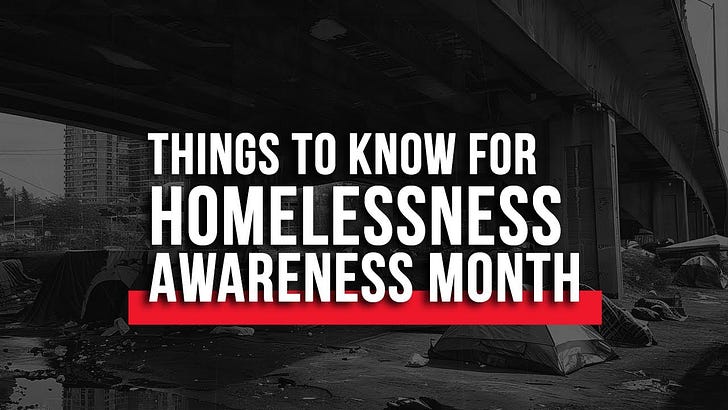Two days ago, I hosted and moderated a panel on behalf of Simmons College of Kentucky to kick off Homelessness Awareness Month.
The event, titled “Empathy in Action: A Collective Call to Combat Homelessness in Louisville,” brought together an inspiring group of advocates, scholars, and community members to explore the intersections of homelessness, public policy, and the unique challenges faced by young adults, families, and individuals experiencing homelessness.
Through Simmons’s Open Doors Initiative, where I serve as a Professor and the Director of Public Policy and Social Change, I shared our mission to empower those without an address on their journey to self-sufficiency through higher education, digital literacy, and skill-building.
Joining me on the panel were Ra'Shann Martin, Executive Director of St. John Center for Homeless Men Shelter; Natalie Harris, Executive Director of the Coalition for the Homeless; Jecorey Arthur, Louisville Metro Council Member and Professor at Simmons College; and Marcus Stubbs, Community Engagement Manager at the Coalition for the Homeless. Each panelist has been deeply involved in addressing homelessness in Louisville. Their insights on policy gaps, community needs, and the barriers people face highlighted the critical work still needed for meaningful change.
While the conversation focused on homelessness, specifically in the Louisville community, it also expanded our thinking about homelessness as a national issue, encouraging us to consider broader solutions and policies.
The discussion took place just two days after the election, and political fatigue was present, as was a collective sense of motivation to do more to ensure that people experiencing homelessness are not forgotten in the days and months to come.
People expressed deep concerns about how new policies and growing stigma might impact those who are unhoused more.
Questions included: Will people without a permanent address become even more vulnerable? Will more resources be available, or will social stigma continue to influence the public’s response to the unhoused community?
These questions gave us pause, but they also invited us to lean in deeper. They became the core of our discussion as we explored the urgent need for compassionate policies and practical, long-term solutions.
Our discussion also brought us to recent findings from a report by the Coalition for the Homeless, highlighting that homelessness in Louisville increased by 41% between 2018 and 2021, with a notable rise in individuals seeking services beyond shelter. We has increased even more as we head into 2025.1
As well as, nationally, the Department of Housing and Urban Development’s most recent data reported over 650,000 people experiencing homelessness in 2022—a 12.1% increase across the country, but has increased more as well.2
This data served as a stark reminder of the urgency of our collective work and the pressing need for solutions grounded in empathy and action.
During the panel, not only did we focus on recognizing the dignity and humanity of people who are unhoused, but we all spoke about how, too often, the stigma around homelessness makes people turn away instead of engaging with compassion.
It made us look at the realities of stigma and how it can hinder social change and cause inaction rather than action.
The next day, after the panel, I thought about how we can each do more to support people facing homelessness—not just during Homelessness Awareness Month but all year. So, I recorded a video to explain the month and share some ways we can all make a difference.
If you want to learn some things you can do right now, check out the video below:
What is Homelessness Awareness Month?
Homelessness Awareness Month, which is recognized each November, started in 2007 when the U.S. Senate first declared it National Homeless Youth Awareness Month to address the rising crisis of youth homelessness.3 Over time, this focus expanded to include the broader realities faced by people experiencing homelessness of all ages—young adults, families, veterans, and people across the country. During Homelessness Awareness Month, communities, advocates, and organizations work together to challenge stigma, raise awareness, and push for real, long-term solutions. This month is a call to action, reminding us everyone deserves stable, safe housing. Through public education, events, and community engagement, Homelessness Awareness Month calls on us to confront the root causes of homelessness and to work toward creating a society where everyone has a place to call home.
Coalition for the Homeless. Addressing Urgent Needs: A 2022 Analysis of Homelessness in Louisville. Louisville, KY, 2022.
U.S. Department of Housing and Urban Development. The 2023 Annual Homeless Assessment Report. Washington, DC, 2023.
National Child Traumatic Stress Network. "National Homeless Youth Awareness Month." Accessed November 2023. https://www.nctsn.org/resources/public-awareness/national-homeless-youth-awareness-month.
Listen to the Imgaine Dignity Podcast [HERE]
Order “Zion Learns To See: Opening Our Eyes To Homelessness” [HERE]
If you want to explore homelessness in the U.S., please consider reading “I See You: How Love Opens Our Eyes to Invisible People.”
Explore my book “When We Stand: The Power of Seeking Justice Together” to learn about the impact of community involvement and collective action on social change.
Discover “All God’s Children: How Confronting Buried History Can Build Racial Solidarity to gain insight into the significance of understanding the historical narratives that shape people and how you might stand in solidarity with your neighbor.
Or, subscribe to the Love Beyond Walls Newsletter—by visiting the site and signing up.



